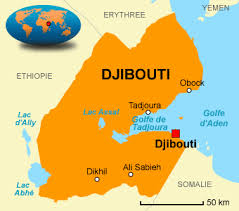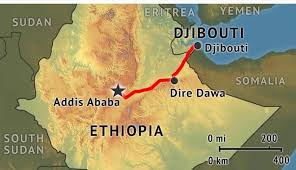By Mohammed Warsame
In light of Djibouti’s fortuitous positioning between East Africa and the Middle East, and on a key trade route between Asia and Europe, the country has long played a central role in regional trading. Increasingly, however, it is looking to parlay that lineage into an even greater role, expanding infrastructural capacity and linkages to ensure the small 800,000-person nation is able to act as a prominent gateway to the fast-growing markets surrounding it.
Projects
 More than $14bn worth of new airports, pipelines, port and terminal facilities, and roads and railways are under construction, underwritten by several vast public and foreign investment schemes. Whilst some new transport infrastructure will service passenger travel to and from the country – such as the two new airports under construction – the bulk of the projects will be developed to suit different types of cargo, such as minerals, energy products, bulk and containerised goods, and even livestock.
More than $14bn worth of new airports, pipelines, port and terminal facilities, and roads and railways are under construction, underwritten by several vast public and foreign investment schemes. Whilst some new transport infrastructure will service passenger travel to and from the country – such as the two new airports under construction – the bulk of the projects will be developed to suit different types of cargo, such as minerals, energy products, bulk and containerised goods, and even livestock.
Many of the new investments are looking to leverage the country’s role as the primary entry point to the 95m-person Ethiopian market next door, with Djibouti currently handling more than 90% of goods bound for its neighbour. Ethiopia’s economy expanded by more than 8.5% in 2014/15 and is expected to grow 8% in 2015/16, according to the IMF. This will create a driving demand for imports, of which the vast majority are channeled through Djibouti’s ports and transported on its roads. Forecasts for robust growth in Ethiopia in the medium term bode well for Djibouti, with increases in Ethiopia’s exports also set to boost outbound traffic and revenue from Customs duties.
There is a clear need for Djibouti to expand capacity, particularly as competition increases from nearby ports, such as Kenya’s planned Lamu installation and the potential development of facilities at Berbera in Somaliland. Amidst unrest elsewhere in the Horn of Africa and nearby Yemen, Djibouti is also hoping to capitalise on the security of its transport facilities to serve the roughly 400m landlocked consumers located in East Africa. “Even before Dubai, Singapore and Hong Kong, the economic and maritime hubs in the region were Aden and Djibouti,” Aboubaker Omar Hadi, chairman of the Djibouti Ports and Free Zones Authority (Autorité des Ports et Zones Franches Djibouti, APZFD), told media in May 2015. “We know what to do to regain our place.”
A total of six major ports and terminals are being developed across the country, in conjunction with new road links, railway links and two international airports. To complement the improved transport networks, Djibouti is also establishing several new free trade zones. These new transport facilities worth billions of dollars will, it is hoped by authorities, ensure Djibouti’s competitiveness as a regional transport platform, even as countries like Kenya and Egypt look to improve their capacity.

“Djibouti’s major infrastructure projects – including new ports, railways, roads, airports and free zones – will strengthen Djibouti’s position as a regional hub for transport and logistics services,” Moussa Ahmed Hassan, minister of equipment and transport, told OBG. “Having a comprehensive transport eco-system is crucial for Djibouti to be competitive, attract investment and create jobs.”
The country’s large-scale infrastructure investments – a sizeable percentage of which are being led by the government – are weighing on Djibouti’s public finances. The IMF, for example, has raised concerns about the size of the country’s fiscal deficit , which spiked in 2015 – with some estimates putting it at 16.5% of GDP, against 12.2 in 2014 – and has been funded in part by debt issuances, with the public debt now equal to more then half of GDP. However, the deficit is expected to decline to 11.4% in 2016 and more importantly, it is being driven by capital spending, rather than current expenditures. This should lift the country’s growth potential in the long-term.
Transport operations remain essential to Djibouti’s economy. Sitting in the Gulf of Aden and on one of the world’s busiest trade routes linking Europe, Africa and Asia, Djibouti has built its economy around transport and logistics services.
“Our strategic location at the Horn of Africa and at the entrance of the Red Sea, the second busiest sea-lane in the world, allow us many opportunities. On one hand, we have access to the dynamic East African markets like Ethiopia and countries beyond where we find the most fertile lands on the continent, and on the other hand we have the potential to become a major trans-shipment hub for the Red Sea and Indian Ocean regions,” Warsama Hassan Ali, commercial director at DP World Doraleh, an international maritime terminal operator, told OBG.
According to the World Trade Organisation’s (WTO) Trade Policy Review on Djibouti, published in September 2014, the transport sector accounts for 35% of GDP. More broadly, trade in goods and services represents about 94% of Djibouti’s GDP, with the bulk of this attributed to Ethiopian demand. The African Development Bank has estimated that the services sector accounts for almost 80% of the Djiboutian economy, of which 55% comes from trade and commerce services. The services sector employs around 70% of the population, a large proportion of which are employed in activities linked to the transport sector. However, the report also states that transport services remain under-explored and continue to provide ample possibilities for job creation, one of the country’s most pressing issues. “Large-scale infrastructure projects, such as the new railways and ports, create a lot of jobs; for example, there are more than 1000 Djiboutians currently working on the project,” Moussa Ahmed told OBG. “This is crucial to Djibouti’s development. While such projects may need know-how and foreign expertise, it is essential to ensure that the benefits are passed on to ordinary Djiboutians.”
Read more: Djibouti Must Improve Infrastructures
Mohammed Warsame
Email: [email protected]
We welcome the submission of all articles for possible publication on WardheerNews.com. WardheerNews will only consider articles sent exclusively. Please email your article today . Opinions expressed in this article are those of the author and do not necessarily reflect the views of WardheerNews.
WardheerNew’s tolerance platform is engaging with diversity of opinion, political ideology and self-expression. Tolerance is a necessary ingredient for creativity and civility.Tolerance fuels tenacity and audacity.
WardheerNews waxay tixgelin gaara siinaysaa maqaaladaha sida gaarka ah loogu soo diro ee aan lagu daabicin goobo kale. Maqaalkani wuxuu ka turjumayaa aragtida Qoraaga loomana fasiran karo tan WardheerNews.
Copyright © 2024 WardheerNews, All rights reserved


